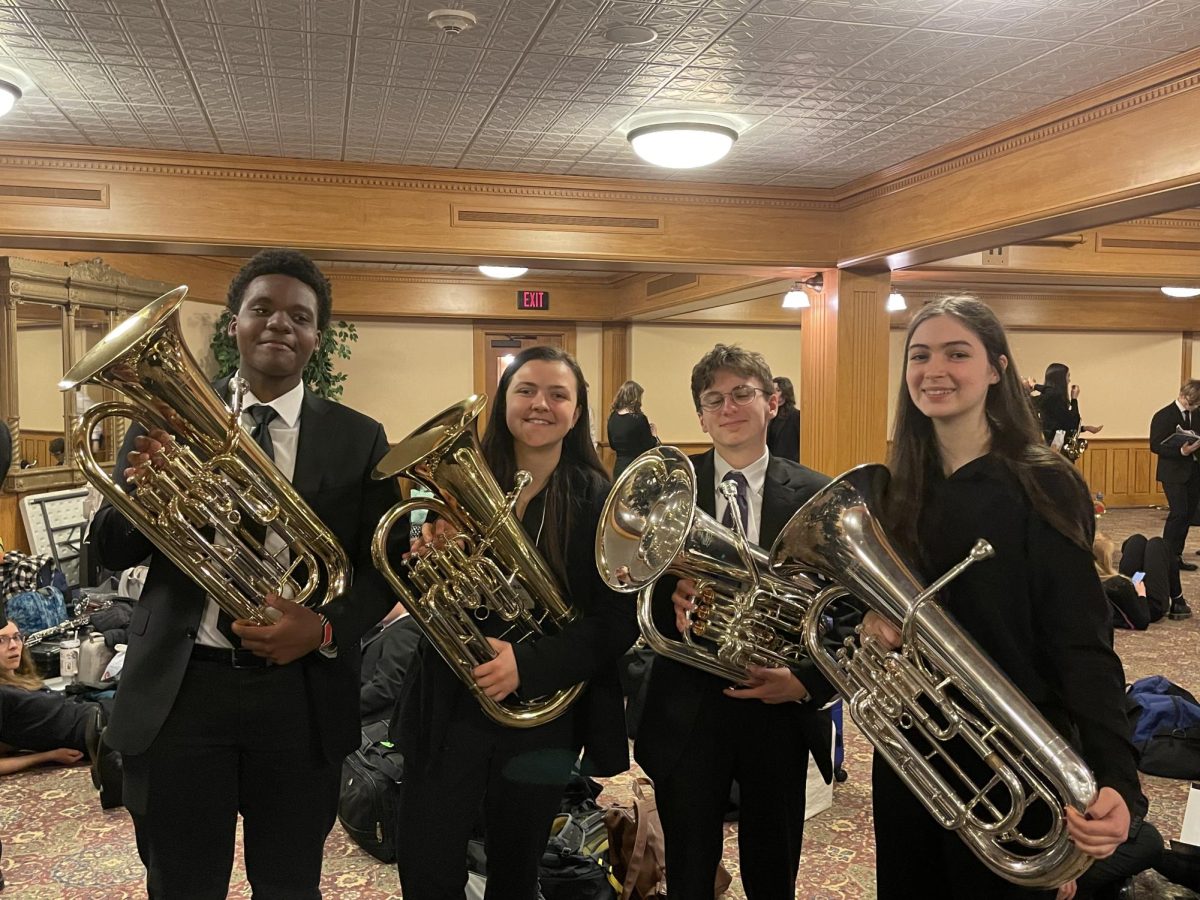Lost in the sweet sound, soothing the mind with a blanket of safety and serenity. Suddenly, surprisingly, interrupted: a sneeze. A head hitting the mouthpiece, the musician scrambling to get back on track. Laughing now, the music starts, once again blanketing the audience with the sweet sound of the euphonium. The audience may be unaware of this unknown instrument, but it is all too familiar to musician Miranda Bergeron ‘25.
A Musical Beginning

First falling in love with music as a young child, Bergeron began her journey in the black-and-white world of the piano. Looking for more, she switched to the guitar, before seriously taking up the flute in the fourth grade.
Connecting with the instrument, the flute provided a musical outlet and cultivated her passion for performing.
This cultivated soil of excitement provided the perfect garden for new opportunities to blossom. Soon, when the middle school band was searching for low-brass players, Bergeron chose to make the switch. “I didn’t connect with [the flute] as well and didn’t enjoy playing it as much,” she explained.
The size of the tuba was more than enough intimidation to convince her otherwise, so she decided on the euphonium.
A Unique Sound
The name “euphonium” comes from the Greek word euphōnos which means sweet sounding. The conical (expanding tunnel-shaped) bore creates this unique sound in the same range as a trombone. The sound is primarily what makes the euphonium so different. There is a special part about it that captures the heart of musicians. “I love the sound that I’m able to make and the music I can play on it,” said Bergeron.
Getting caught up in this sound, Bergeron becomes lost; adrift in the intricate notes and simplistic melodies weaving her through valleys and mountains. This sense of euphoria is what makes music such a therapeutic activity for many. “When you are just practicing [the euphonium] or playing a piece that you really like, it’s a very free feeling,” explained Bergeron.
The waves of sound dance against the walls, washing a very calming feeling upon the listener. For the creator, it’s a similar simple sensation. “You’re just there with the pretty sound,” said Bergeron. It’s her, the music and nothing else.
A Musical Community
As her playing ends, the waves suddenly crash to a finale and she is jolted from this haze. She realizes it’s actually her, the music and the community of people around her.
Whether it is at her local lessons, the Hollis Brookline High School concert band, or the New Hampshire All-State Music Festival, Bergeron has discovered a wonderful group of people. “[Music] helped me find a community that I really enjoy being in,” she said.
“There are lots of people who love playing music or even just listening to music, and being able to be part of that is a great experience,” fellow musician Elliott Miller ‘24 further detailed.
Building bonds over a similar passion has sparked conversations and created friendships. “It really helped not only my music but also the social aspect,” said Bergeron.
Such community is critical when the more difficult parts of playing an instrument arise. Bergeron cites one of the biggest obstacles of playing the euphonium as performance anxiety. Like many other musicians, she deals with the stress of playing in front of large crowds. Her community around her has helped her work through this challenge.
“A sense of community is also important in not having nerves because you’re going to have people around you who are also performing at the same time that you’re used to playing with,” said pianist Meghan Warren ‘25.
Band teacher Charles Rogers explained the importance of trusting each other as a team. “Whether they’re friends outside of the room, they play together every day. They know each other musically and there is trust there,” said Rogers.
Bergeron and fellow musicians have also learned to manage this stress by improving their skills. “When you learn the instrument more and are more familiar with the pieces that you’re playing, it becomes a lot easier to get through it because it’s just like muscle memory,” said Bergeron.
Making the process more routinized helps reduce the thoughts of anxiety circling her brain. “We prepare and feel confident in our parts so by the time we get out there and play in front of an audience we can have fun,” said Rogers.
A Passion Cultivated
Playing the euphonium is also more streamlined because is primarily a concert band instrument. This means that a majority of euphonium players are solely interpreting notes on the page, rather than freely creating pieces in jazz combos or improvised solos. That being said, Bergeron finds that euphoniumists can still creatively explore their music. “You can express so many different emotions through the way you play,” said Bergeron.
One of her favorite pieces to emphasize this is “Mars, the Bringer of War,” composed by Gustav Holst for his orchestral suite The Planets. “That song has so much more strength, which is very different from other pieces,” said Bergeron.
Today, due to the exclusion of the euphonium by popular composers, Bergeron plays an instrument with lower demand. Other instruments are in greater need in many bands and pieces. Still, musicians like Bergeron swim against the current and choose passion over popularity. “I play the euphonium because it’s my choice,” said Bergeron.
Still, she faces the challenge of playing a relatively unknown instrument. All day, she listens to people question: What even is that? or Is that even an instrument? Nevertheless, she never stops raving about how amazing of an instrument it is to play.
As for the future, Bergeron hopes to carry her love for music and the euphonium through the rest of her life. She knows she will find some sort of place for it. Music has always been her thing and it would be hard to give that up. “I don’t know what I’d be doing without music right now. It’s such a big part of my life,” said Bergeron.






![Students perform one of the plays from the 24-Hour Play Festival. The actors had less than 12 hours to fully learn the script and prepare for the performance. “[The actors] had to memorize it in a day and also make it their own in a short amount of time,” said Toner. (Courtesy Adrienne Rosenblatt)](https://cavchronline.com/wp-content/uploads/2025/01/24-Hour-play.jpg)
